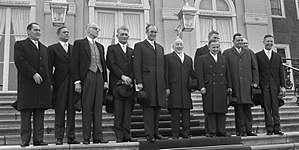De Jong cabinet | |
|---|---|
Cabinet of the Netherlands | |
  The installation of the De Jong cabinet on 5 April 1967 | |
| Date formed | 5 April 1967 |
| Date dissolved | 6 July 1971 4 years, 92 days in office (Demissionary from 28 April 1971) |
| People and organisations | |
| Monarch | Queen Juliana |
| Prime Minister | Piet de Jong |
| Deputy Prime Minister | Johan Witteveen Joop Bakker |
| No. of ministers | 14 |
| Ministers removed | 1 |
| Total no. of members | 15 |
| Member party | Catholic People's Party (KVP) People's Party for Freedom and Democracy (VVD) Anti-Revolutionary Party (ARP) Christian Historical Union (CHU) |
| Status in legislature | Centre-right Majority government |
| History | |
| Election | 1967 election |
| Outgoing election | 1971 election |
| Legislature terms | 1967–1971 |
| Incoming formation | 1967 formation |
| Outgoing formation | 1971 formation |
| Predecessor | Zijlstra cabinet |
| Successor | First Biesheuvel cabinet |
| Part of the Politics series |
![Azure, billetty Or a lion with a coronet Or armed and langued Gules holding in his dexter paw a sword Argent hilted Or and in the sinister paw seven arrows Argent pointed and bound together Or. [The seven arrows stand for the seven provinces of the Union of Utrecht.] The shield is crowned with the (Dutch) royal crown and supported by two lions Or armed and langued gules. They stand on a scroll Azure with the text (Or) "Je Maintiendrai" (French for "I will maintain".)](http://upload.wikimedia.org/wikipedia/commons/thumb/8/8f/State_coat_of_arms_of_the_Netherlands.svg/150px-State_coat_of_arms_of_the_Netherlands.svg.png) |
|---|
|
|
The De Jong cabinet was the executive branch of the Dutch Government from 5 April 1967 until 6 July 1971. The cabinet was formed by the christian-democratic Catholic People's Party (KVP), Anti-Revolutionary Party (ARP) and Christian Historical Union (CHU) and the conservative-liberal People's Party for Freedom and Democracy (VVD) after the election of 1967. The cabinet was a centre-right coalition and had a substantial majority in the House of Representatives with prominent Catholic politician Piet de Jong the Minister of Defence in the previous cabinet serving as Prime Minister. Prominent Liberal politician Johan Witteveen a former Minister of Finances served as Deputy Prime Minister and returned as Minister of Finance, prominent Protestant politician Joop Bakker the Minister of Economic Affairs in the previous cabinet served as Deputy Prime Minister, Minister of Transport and Water Management and was given the portfolio of Suriname and Netherlands Antilles Affairs.
The cabinet served in the final years of the tumultuous 1960s and the beginning of the radical 1970s. Domestically it had to deal with the peak of the counterculture but it was able to implement several major social reforms to education, social security, the introduction of value-added taxes and it had to deal with several crises involving Moluccan nationalists. Internationally it oversaw improvements in relations with the former Dutch East Indies, growing protests against the Vietnam War and the fallout of the Soviet Union invasion of Czechoslovakia following the Prague Spring. The cabinet suffered no major internal conflicts and completed its entire term and was succeeded by the First Biesheuvel cabinet following the election of 1971.[1][2][3]
- ^ (in Dutch) P. J. S. (Piet) de Jong 5 April 1967 – 6 juli 1971, Geschiedenis24, 9 December 2005
- ^ (in Dutch) De putschisten zijn onder ons, De Groene Amsterdammer, 28 October 2005
- ^ "Het succesvolle kabinet-De Jong 1967–1971" (in Dutch). Historiek. 28 January 2014. Retrieved 16 March 2018.